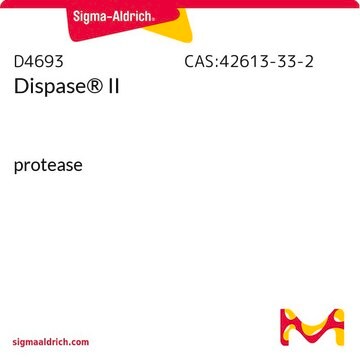MAB858-2
Anti-RSV Antibody, glycoprotein, all type A, B strains, clone 131-2G
clone 131-2G, from mouse
Synonym(s):
RSV
Sign Into View Organizational & Contract Pricing
All Photos(1)
About This Item
UNSPSC Code:
12352203
eCl@ss:
32160702
NACRES:
NA.41
Recommended Products
biological source
mouse
Quality Level
antibody form
purified immunoglobulin
antibody product type
primary antibodies
clone
131-2G, monoclonal
species reactivity
human
manufacturer/tradename
Chemicon®
technique(s)
ELISA: suitable
immunofluorescence: suitable
isotype
IgG1κ
shipped in
wet ice
General description
RSV is a labile paramyxovirus that produces a characteristic fusion of human cells in tissue culture--the syncytial effect. Two subtypes, A and B, have been identified. Subtype B are characterized as the asymptomatic strains of the virus. The more severe clinical illnesses involve Subtype A strains.
Specificity
Glycoprotein, 89 kD. Recognizes both A and B strains.
Immunogen
A2
Epitope: some type B strains
Application
Detect Respiratory Syncytial Virus using this Anti-RSV Antibody, glycoprotein, all type A, B strains, clone 131-2G validated for use in ELISA & IF.
ELISA
Indirect Immunofluorescence (fresh frozen tissue sections)
Final working dilutions must be determined by end user.
Indirect Immunofluorescence (fresh frozen tissue sections)
Final working dilutions must be determined by end user.
Research Category
Infectious Diseases
Infectious Diseases
Research Sub Category
Infectious Diseases - Viral
Infectious Diseases - Viral
Physical form
Format: Purified
Purified immunoglobulin. 1 mg/mL in 0.02M PB with 0.25M NaCl, pH=7.6 containing 0.1% sodium azide.
Storage and Stability
Maintain at 2 to 8° C in aliquots for up to 12 months after date of receipt. Do not store in diluted format.
Other Notes
Concentration: Please refer to the Certificate of Analysis for the lot-specific concentration.
Legal Information
CHEMICON is a registered trademark of Merck KGaA, Darmstadt, Germany
Disclaimer
Unless otherwise stated in our catalog or other company documentation accompanying the product(s), our products are intended for research use only and are not to be used for any other purpose, which includes but is not limited to, unauthorized commercial uses, in vitro diagnostic uses, ex vivo or in vivo therapeutic uses or any type of consumption or application to humans or animals.
Not finding the right product?
Try our Product Selector Tool.
Storage Class Code
10 - Combustible liquids
WGK
WGK 2
Flash Point(C)
Not applicable
Certificates of Analysis (COA)
Search for Certificates of Analysis (COA) by entering the products Lot/Batch Number. Lot and Batch Numbers can be found on a product’s label following the words ‘Lot’ or ‘Batch’.
Already Own This Product?
Find documentation for the products that you have recently purchased in the Document Library.
Caixia Su et al.
NPJ vaccines, 7(1), 168-168 (2022-12-20)
Respiratory syncytial virus (RSV) infection in children is the most common viral respiratory infection and can cause severe lung damage or death. There is no licensed vaccine for preventing RSV infection. Previously we demonstrated that an RSV vaccine, BARS13, consisting
Rachel J Derscheid et al.
Viruses, 5(11), 2881-2897 (2013-11-29)
Respiratory syncytial virus (RSV) is the most common cause of bronchiolitis in infants and young children. A small percentage of these individuals develop severe and even fatal disease. To better understand the pathogenesis of severe disease and develop therapies unique
Ana M Nuñez Castrejon et al.
Journal of virology, 96(7), e0220121-e0220121 (2022-03-11)
Respiratory syncytial virus (RSV) is a leading cause of severe lower respiratory tract disease of children, the elderly, and immunocompromised individuals. Currently, there are no FDA-approved RSV vaccines. The RSV G glycoprotein is used for viral attachment to host cells
B Cortjens et al.
Journal of virology, 91(10) (2017-03-10)
Respiratory syncytial virus (RSV) causes severe respiratory disease in young children. Antibodies specific for the RSV prefusion F protein have guided RSV vaccine research, and in human serum, these antibodies contribute to >90% of the neutralization response; however, detailed insight
Bo Liang et al.
Journal of virology, 93(7) (2019-01-18)
Human respiratory syncytial virus (RSV) is a major pediatric respiratory pathogen. The attachment (G) and fusion (F) glycoproteins are major neutralization and protective antigens. RSV G is expressed as membrane-anchored (mG) and -secreted (sG) forms, both containing a central fractalkine-like
Our team of scientists has experience in all areas of research including Life Science, Material Science, Chemical Synthesis, Chromatography, Analytical and many others.
Contact Technical Service






